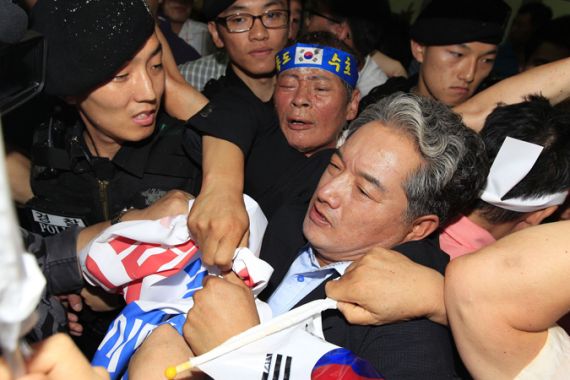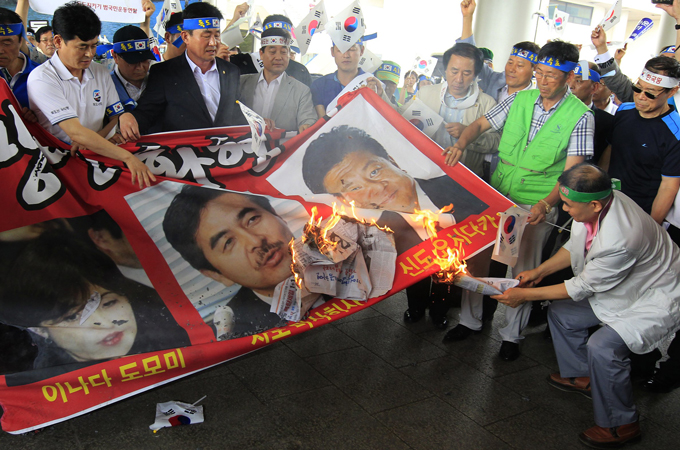South Korea bars Japan MPs over islands row
Three MPs refuse to return home after being refused entry in Seoul, in apparent bid to reassert disputed islands’ claim.

 |
| The disputed islands are a sensitive issue for South Koreans who remember Japanese colonial rule. [Reuters] |
Three Japanese politicians are refusing to fly home to Japan after South Korea’s justice ministry banned their entry upon arrival.
The three members of Japan’s conservative Liberal Democratic Party arrived in Seoul’s Gimpo International Airport early on Monday, morning on an apparent mission to reassert Japan’s claim to disputed islands.
Airport authorities stopped them from passing through immigration, citing a law which prohibits entry of anyone who could harm South Korea’s national interests or public safety.
Lee Jeong-jin, a Korea immigration service spokesman, said that they refused repeated offers to be put on the next flight back to Tokyo.
“The legislators have been at Gimpo for over six hours now because they refuse to leave until they get a clear reason for their entry denial,” Lee told Al Jazeera.
“They are looking for some sort of further explanation or acknowledgement from the foreign ministry regarding this entry ban.”
The foreign ministry said it would not intervene in the standoff.
“We have no plan to reach out … they’ll go back when they think they can no longer stick around,” a spokesman said.
The ministry had notified the legislators on Friday of its policy to deny them entry upon arrival.
Territorial dispute
The three Japanese politicians had planned to visit Ulleung island, the closest South Korean territory to the uninhabited Dokdo islands in the Sea of Japan (East Sea), which are known in Japan as Takeshima.
One of the politicians is Yoshitaka Shindo, the grandson of a general in the imperial Japanese army, who has previously accused South Korea of “illegally and militarily” occupying “what is undoubtedly our territory”.
“We don’t intend to fight there. We want to express our feeling of anger to the South Korean people,” Shindo says in a video message posted on his website.
The other two legislators are Tomomi Inada, a former lawyer who denies the 1937 Nanjing massacre by Japanese troops in China, and Masahisa Sato, a former member of the military who headed a Japanese reconstruction mission to Iraq in 2004.
Shindo said at Gimpo airport on Monday that Dokdo rightfully belonged to his country.
“However, we must discuss the issues as there is a difference in opinion between Japan and South Korea,” Shindo said, according to the South Korean Yonhap news agency.
“If our entry is denied, we will visit once gain.”
He said the entry ban might evolve into a diplomatic row between the nations.
Bitter memories
Earlier, hundreds of South Korean protesters gathered at Gimpo airport to protest against the three legislators’ arrival.
They carried banners which read “Stop Japan!” and “You die!”, while other protesters carried a coffin plastered with photos of the politicians.
One group set fire to photos of the three, while others got caught in small scuffles with the police as they tried to enter a security area to “hunt down” the legislators.
The disputed islands are a sensitive issue for the South Koreans, especially for the older generations who still have bitter memories of Japan’s harsh colonial rule over Korea from 1910-45.
South Korea says it regained control over all of its territory, including Dokdo, at the end of the colonial period.
It posts a small coastguard force on Dokdo and has sought to strengthen its control over the islets after Tokyo in March authorised new school textbooks reasserting its claims to them.
In a rare showcase of solidarity with the South, North Korea condemned the Japanese legislators’ planned trip.
“The Japanese reactionaries’ recent moves are serious issues not to be tolerated by the Korean nation,” a commentary on the official KCNA news agency said, accusing the three of trying to seize both Ulleung and Dokdo islands.